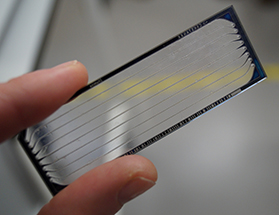
The Cancer Research UK Cambridge Centre has joined the international data-sharing consortium, Project GENIE. The project is generating a powerful evidence base for precision cancer medicine by integrating clinical-grade cancer genomic data with clinical outcome data for tens of thousands of cancer patients treated at multiple institutions worldwide.
The number of institutions participating in the American Association for Cancer Research (AACR) initiative known as AACR Project Genomics Evidence Neoplasia Information Exchange (GENIE) has increased by eleven. The consortium was established in 2016 with eight leading cancer institutions in North America and Europe coming together to share anonymised genetic data on nearly 20,000 patients. Information uploaded so far includes data on non-small cell lung cancer, breast cancer, colorectal cancer, glioma, pancreatic cancer, melanoma, ovarian cancer, prostate cancer and leukaemia.
The eleven new participants of the AACR Project GENIE consortium are:
• Children’s Hospital of Philadelphia (CHOP’s Cancer Center); Pennsylvania
• Cancer Research UK Cambridge Centre, University of Cambridge, England;
• Duke University (Duke Cancer Institute), Durham, North Carolina;
• Columbia University (Herbert Irving Comprehensive Cancer Center), New York;
• Swedish Cancer Institute, Seattle, Washington;
• Providence Cancer Institute, Portland, Oregon;
• Wake Forest University Health Sciences (Wake Forest Baptist Medical Center), Winston-Salem, North Carolina;
• The University of Chicago (Comprehensive Cancer Center), Illinois;
• University of California – San Francisco (UCSF Helen Diller Family Comprehensive Cancer Center), California;
• Vall d’ Hebron Institute of Oncology, Barcelona, Spain; and
• Yale University (Yale Cancer Center), New Haven, Connecticut.
With this, there are now 19 institutions contributing clinical-grade genomic and clinical outcomes data to the AACR Project GENIE registry, and more are anticipated to be added in the near future.
Professor Carlos Caldas, Director of CRUK Cambridge Centre Breast Cancer Programme, said, “Our participation in GENIE is part of our commitment to help the cancer fight by sharing of data and collaboration with colleagues outside Cambridge. It is from this open approach that more rapid progress will be made.”
“We are extremely excited to make good on our promise of adding new participating institutions to AACR Project GENIE,” said Charles L. Sawyers, MD, FAACR, chairperson of the AACR Project GENIE Steering Committee, chairperson of the Human Oncology and Pathogenesis Program at Memorial Sloan Kettering Cancer Center in New York, and an investigator of the Howard Hughes Medical Institute.
“In just two years, the founding institutions of the project have been able to accumulate and make public more than 39,000 de-identified genomic records. Now that we have more than doubled in size, we anticipate a substantial acceleration in the pace at which the registry will grow, increasing our ability to benefit patients even sooner.”
The first public release of cancer genomic data aggregated through AACR Project GENIE occurred in January 2017. It included nearly 19,000 de-identified genomic records. Two further public releases of 12,869 and 7,600 de-identified genomic records in November 2017, and January 2018, respectively, increased the registry to 39,600. Data from new participating institutions are expected in the January 2019 public release.
“I am extremely proud that the American Association for Cancer Research, as the Coordinating Center for AACR Project GENIE, has been able to accept new participants for this important project,” said Margaret Foti, PhD, MD (hc), chief executive officer of the AACR.
“This is a testament to the successes that have already been achieved through collaboration by the eight founding international institutions. As we welcome new members, we look forward to accelerating the pace at which this revolutionary initiative will harness cancer genomics research to enhance the future utility of precision medicine in the treatment of cancer and for the benefit of patients around the world.”















